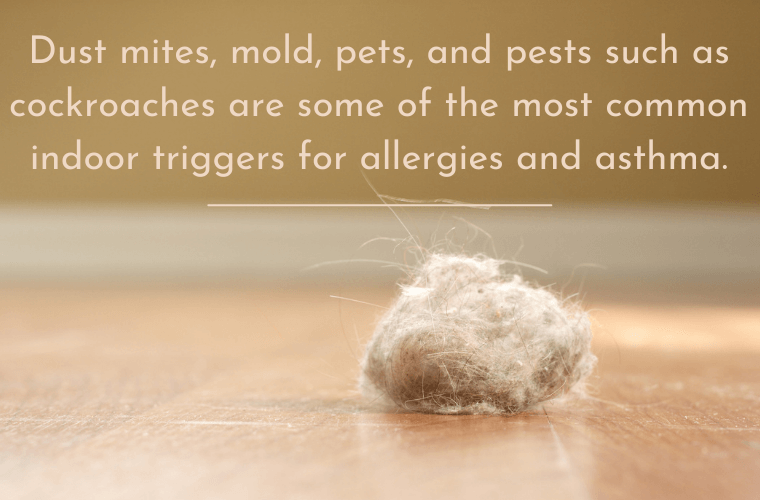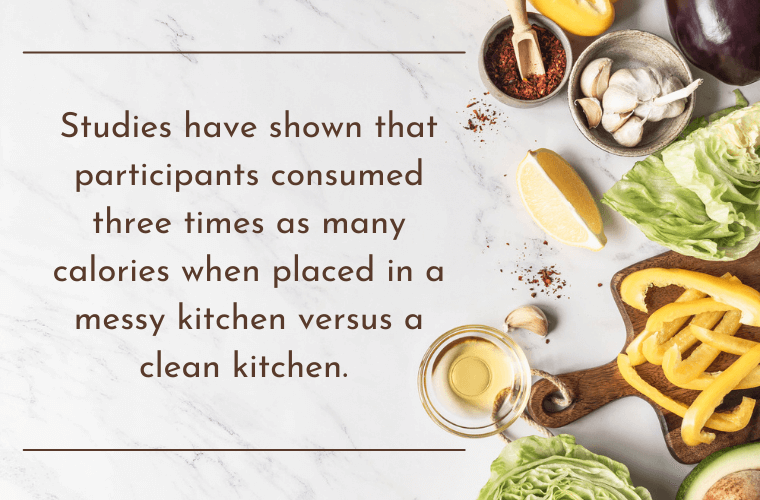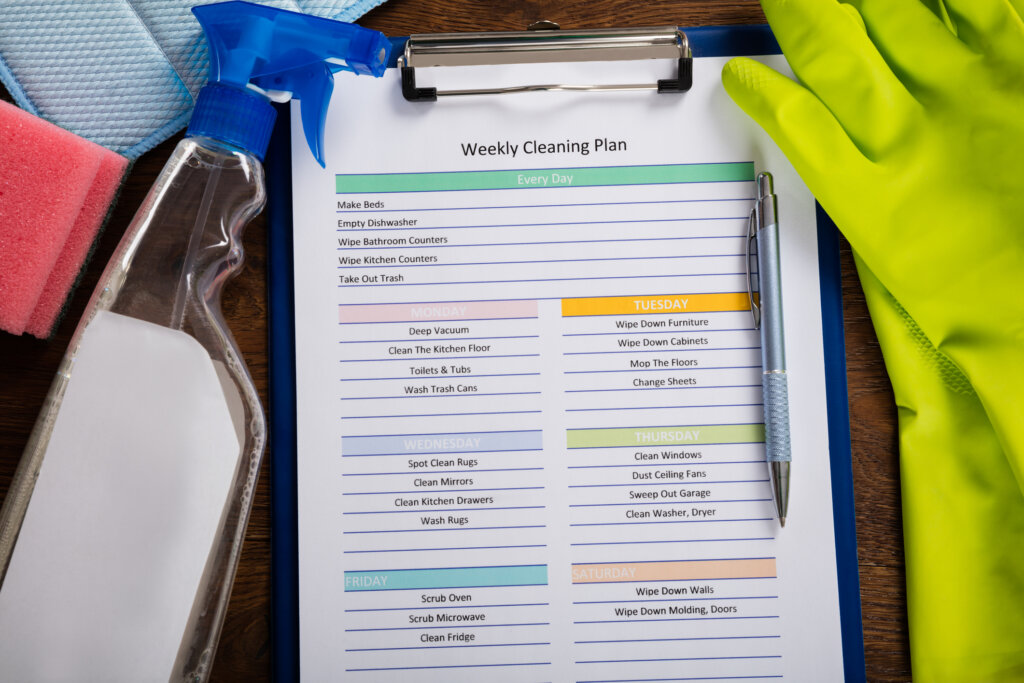A clean home is a healthy home. It’s that simple. For some, cleaning an entire house can be a daunting task. Depending on the state of your home, there might be a significant amount of work to get started.
The good news is that along with the many health benefits of a clean home, with consistency, you can maintain a tidy house in just a few minutes per day.
This article will explore the health benefits of a clean and tidy home, along with some tips for organization and upkeep.

Health benefits of cleaning include reduced allergy and asthma symptoms, lessening the spread of germs, reducing pests, and improving physical and mental health.
Reduce Allergy and Asthma Symptoms

Before looking further into the benefits of reducing allergens in the home, it is essential to note that strong chemical household cleaners such as bleach, cleaners containing ammonium compounds, or chemicals with strong fragrances can temporarily increase allergy and asthma symptoms. If this is a concern for you, try looking for asthma and allergy-friendly products.
Dust mites are the most common allergens that can trigger an asthma attack. These microscopic pests are commonly found in bedding, carpet, and soft furniture that cannot be washed.
To help combat dust mites, wash and completely dry bedding weekly and use allergy-proof pillowcases. Vacuum 1-2 times per week using a HEPA filter. Dust general areas in your home about once per month.
Mold spores live in damp areas of your house. Water and moisture are perfect for mold growth. Kitchens, bathrooms, basements, and places where previous water damage has occurred are all areas where mold can be present.
Because mold needs moisture, the best thing you can do to prevent growth is to keep areas dry. Some options to reduce and avoid mold in your house are scrubbing visible mold on hard surfaces, using air conditioning or a dehumidifier, and fixing water leaks as soon as possible.

Pet dander allergies from cats and dogs affect approximately 10-20% of the population. Because the allergen comes from the dander, trimming fur does not help.
To prevent allergens, you can keep bedroom doors shut, wash animal beds and toys often, and bathe and brush pets. Hard floors instead of carpet can significantly help; however, it can be a pricy project. Be aware that no pets are truly hypoallergenic, and choosing a pet should be a well-thought-out decision.
Reducing Pests
According to Pestech, 63% of homes in the United States contain cockroach allergens, affecting 17-41% of people. Mice, rats, and cockroach allergen reactions include itchy and watery eyes, coughing, congestion, eczema, ear infections, and itchy nose and throat.
Combating pests include tasks such as cleaning crumbs and spills, removing standing water, removing clutter, sealing food in airtight containers, and sweeping and vacuuming daily.
Cleanliness and Physical Health

A long-term study at Indiana University found a link between having a clean house and being physically fit. Research scientists found that the home’s interior condition was the only link between physical activity versus participants who did not have a clean house.
Although cleaning will not burn calories like an actual workout, getting off the couch and getting a few more steps in for the day from cleaning is not a bad idea, primarily if you work at a desk. Not to mention, if you do decide to clean something, you also have the immediate reward of a clean space.
A study by Cornell University found a correlation between poor food choices and a messy house. Participants were placed in either a clean kitchen or a chaotic kitchen. Those placed in the chaotic kitchen consumed nearly 3 times the amount of calories compared to the participants placed in the clean kitchen. Researchers found this was due to the “out-of-control mindset” of those in the messy kitchen.
Better Sleep and Mental Health
Regular cleaning not only improves physical health, a clean and organized home can also boost your mood and can help put you in a better mental space.
Clutter can affect sleep, anxiety, and attention span. A study by the National Sleep Foundation found that people that made their beds and had clean sheets were 19% more likely to have a restful sleep. Lack of sleep is often linked to several mental illnesses such as anxiety and depression.
A study conducted by UCLA found that clutter can raise cortisol levels, leading to anxiety, depression, and stress. Stress can lead to unhealthy eating habits and a lack of exercise.
Clean homes promote relaxation, orderliness, and calmness, which are all great ways to reduce stress levels. When your home is clean, focus increases because there are fewer distractions.
Stopping the Spread of Germs
The National Science Foundation tested 30 everyday items around people’s homes to track the growth of mold, yeast, and coliform bacteria. They found that the kitchen is responsible for three of the top five dirtiest areas of a house.
The germiest spot was sponges and dish rags, 75% of which were shown to contain coliform bacteria (the bacteria responsible for E. coli and salmonella). Sponges and rags pick up bacteria from dishes and countertops and can take a long time to dry, making the perfect environment for bacteria to grow.
Other top places for germs include the kitchen sink, toothbrush holders, pet bowls, and coffee reservoirs.

Clearing Clutter
Starting to clean a messy house can seem like an impossible task. Most homes have too much clutter and knowing where to start can be a challenge.
Removing clutter is key to keeping a clean and tidy home. It can be a daunting task, but once it is done, regular cleaning is much more easily sustainable.
One of the best things to do is start in one room or zone. It could be as simple as clearing off a desk, table, or cabinet. As you declutter, don’t just set items on another surface. Find a reasonable place for it, trash it, or start a box of donations.
Once you’ve cleaned an area, keep it clean by putting things away after using them instead of setting them down on a table or surface. It takes a few minutes at most and can save you time and energy in the long run.
Cleaning Schedule
Trying to get all the housework done in one day can be overwhelming. Not to mention, if you work all week, you are likely dedicating one of your few days off to doing chores.
Cleaning schedules are a great way to keep a cleaning routine. With a schedule, you can divide chores throughout the week. This is done by choosing different rooms to clean on a designated day of the week or by a particular task.
With a schedule, you end up with a daily, short to-do list, making a huge difference in productivity.

However, the best way to use a cleaning schedule is to start with an entirely clean house. This ensures that everything has a place and you won’t be moving clutter from one room to the next without ever really putting things away.
Another benefit of a schedule is that the majority of the house is already clean, so it allows you time to do a deep clean of certain areas or some of the tasks that don’t need to be done daily or weekly.
If you’re skeptical about the house never being fully cleaned for company on a cleaning schedule, due to the fact that you are regularly cleaning, it takes just a little bit of time to have a house company ready.
In addition to that, the house is probably still cleaner than it would have been because things like regular vacuuming, cleaning of bathroom vanities, and are generally managing clutter. Cleaning schedules keep your house consistently more clean, neat, and organized.
Printable Crush has a great editable and printable cleaning schedule that you can download for free. It includes a premade monthly and weekly plan, along with blank versions for customization.
Cleaning Services
Between work, afterschool activities, cooking dinner, and getting the minimum done to get through the week, for some, keeping the house clean may not seem attainable right now.
Although it is not always feasible, hiring a cleaning service to visit once or twice a month can help with overall house cleanliness. Prices range depending on tasks and number of rooms, so you can choose the biggest problem areas for you.
Final Thoughts
Overall, the benefits of a clean home vastly outweigh the consequences of a messy house, even if it means taking a little time out of your evening. A clean home is not only aesthetically pleasing, but it also has many health benefits.
Fewer allergies, asthma symptoms, and reduced germs are just some of the many perks of keeping a clean house. Clean homes lessen stress and anxiety, making them a calmer and more relaxing place to live.
